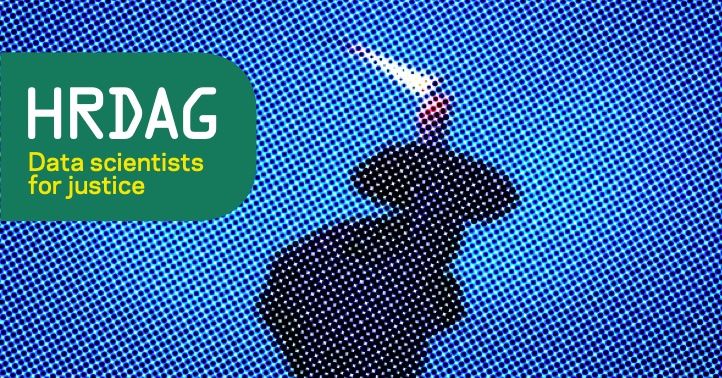
The Role of Databases in Transitional Justice Research
University of Ulster Belfast, IrelandThe Role of Databases in Transitional Justice Research. Megan Price. University of Ulster, Belfast, Ireland, 26 October 2010. Stream Talk Here

The Role of Databases in Transitional Justice Research. Megan Price. University of Ulster, Belfast, Ireland, 26 October 2010. Stream Talk Here

Data Security or Death (or, how to preserve security and privacy in the face of adversarial surveillance). Tyler Dukes (The Reporters’ Lab, Duke University) moderates this discussion with Patrick Ball as one of the guests. (Podcast) 2012.

Counting the Toll: The Production and Consumption of Human Rights Data. Patrick Ball at Mozilla. June 2012. *** Patrick Ball has spent more than twenty years designing databases and conducting quantitative analyses for truth commissions, non-governmental organizations, international criminal tribunals, national tribunals, and United Nations missions in over twenty countries. Using examples from his projects […]

Making the Case: The Production and Consumption of Quantitative Data on Human Rights Abuses. Patrick Ball participates in Translating Human Rights: Bodies of Evidence. International Institute at the University of Michigan, October 2012. *** "Making the Case: The Production and Consumption of Quantitative Data on Human Rights Abuses" Speaker: Patrick Ball, Chief Scientist and Vice […]

Tech Challenge for Atrocity Prevention. Lawrence Woocher (SAIC) moderates this discussion with Patrick Ball as one of the guests. Humanity United and USAID, Google hangout, March 8, 2013. This Google+ Hangout features judges and winners from the USAID and Humanity United co-sponsored Tech Challenge for Atrocity Prevention (thetechchallenge.org), an effort aimed at identifying innovative applications […]

Using Data to Prosecute Genocide. Patrick Ball and Marta Elena Casaus. New America Foundation, May 29, 2013. *** On May 10, 2013, Guatemala made history when General Efraín Ríos Montt became the first former head of state to be tried and convicted for genocide in the courts of his own country. The trial revisited one […]

The Death Toll in Guatemala. Patrick Ball explains the role of statistics and the need for a revised CEH estimate in Guatemala’s 36-year armed conflict. Latin American Studies Association meetings in Washington, DC, May 30 2013. *** Statistician Patrick Ball of Human Rights Data Analysis Group (hrdag.org) gives a talk on new ways to calculate […]

Math on Trial. Patrick Ball and Leila Schneps discuss how math can help (or hinder) the pursuit of justice. (Patrick begins at 36:30.) Moderated by Rachelle Saunders. Skeptically Speaking, August 22, 2013. *** This week, guest host Rachelle Saunders explores the ways that math can help (and hinder) the pursuit of justice. She speaks […]

The Counting Civilian Casualties Book Release. Baruch Fischoff of Carnegie Mellon University, Patrick Ball of HRDAG (Patrick begins at 33:00), and more co-authors. Ford Institute, September 26, 2013. ***** GSPIA Professor Taylor Seybolt, along with Carnegie Mellon's Jay D. Aronson and Baruch Fischhoff, present their new book "Counting Civilian Casualties: An Introduction to Recording […]

Counting Casualties: How the Human Rights Data Analysis Group Quantifies Conflict Violence. Megan Price at the World Social Science Forum 2013. October 13, 2013.

Data Mining for Good: Using random sampling, entity resolution, communications metadata, and statistical modeling to assist prosecutions for disappearance and genocide in Guatemala. Patrick Ball. Chaos Computer Club, Hamburg, December 20, 2013.

How do we know how many people have been killed in Syria? The hard answer is we don't. In this talk, presented at Strata, Megan Price addresses how HRDAG uses random forests, multiple systems estimation, and various Python and R packages to estimate conflict casualties. STRATA February 13, 2014 Santa Clara, California Link to 10-minute […]

Megan Price at RightsCon 2014 In this afternoon "Lightning Talk" at RightsCon 2014, Megan Price spoke about the importance of using models to adjust for variability when reporting human rights violations and mentioned innovative tools that can be used for tracking abuses. RIGHTSCON March 4, 2014 San Francisco, California Link to RightsCon program Back to […]
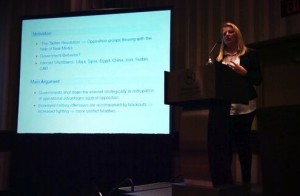
At this year’s International Studies Association Annual Convention, Anita Gohdes presented a talk titled, “Pulling the Plug: Network Disruptions and Violence in the Syrian Conflict,” while director of research Megan Price served on the working group, “Global Trends in War, Conflict, and Political Violence.” International Studies Association Annual Convention March 26-29, 2014 Toronto, Canada Link […]

YANSS podcast 022 On the San Francisco program, You Are Not So Smart, HRDAG director of research Megan Price talked with host David McRaney about Syria, human rights violations, and statistical analysis. The topic was survivorship bias. Megan's part in the podcast begins around Minute 27. From the YANSS blog: "Unfortunately, survivorship bias stands between […]

“Record linkage and other statistical models for quantifying conflict casualties in Syria.” International Symposium on Business and Industrial Statistics (ISBIS)/Conference of the ASA Section on Statistical Learning and Data Mining. Megan Price. Durham, North Carolina. June 10, 2014.

“Global Impact: Statistical Analyses of Conflict Data in Syria, Guatemala, and Colombia — Invited Papers.” Joint Statistical Meetings. Shira Mitchell, Megan Price, Patrick Ball. Boston, Massachusetts, August 5, 2014. Slides.

ASA President Nathaniel Schenker (left) and Patrick Ball, August 2014. At the 2014 Joint Statistical Meetings, Patrick Ball discussed his invited paper, "Human Rights Violations: How Do We Begin Counting the Dead?" Also at the JSM, he was honored as a new Fellow of the American Statistical Association and inducted by ASA President Nathaniel Schenker. Joint […]
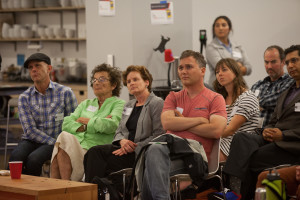
At the Center for Justice and Accountability’s happy hour, “Drink and Think,” Patrick Ball spoke about “Data Mining for Good.” The talk included a discussion of how HRDAG brings human rights abusers to justice through data analysis, and HRDAG’s work conducting quantitative analysis for truth commissions, NGOs, the UN and other partners. The event was […]

Data Mining for Good -- Department of Statistics, University of Indiana–Bloomington. Patrick Ball, speaker. October 20, 2014.
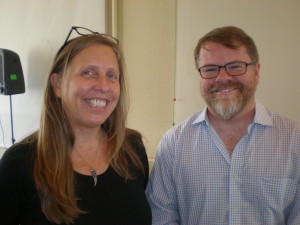
At the Thoreau Center for Sustainability’s “Lunch and Learn,” Patrick Ball spoke about “Data Mining for Good.” The talk included a discussion of how HRDAG uses random sampling, entity resolution, communications metadata, and statistical modeling to assist prosecutions of human rights violators. With an introduction by John DeCock, Chief Operating and Outreach Officer, Bioneers. The Thoreau […]
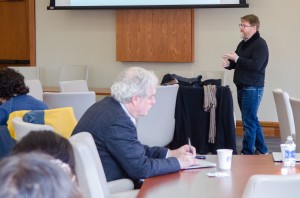
On November 7, 2014, the Department of Political Science, University of Wisconsin–Madison, and the University of Wisconsin Law School, hosted a mini-conference with speakers Jennifer Alix-Garcia, Patrick Ball, Chad Hazlett, Volker Radeloff, and Philip Schrodt to speak about “Big Data and Death.” The conference was organized by John Ahlquist and Jon Pevehouse. Big Data and […]

Megan Price, panelist. Washington, D.C. January 15-16, 2015. Throughout the first day of this meeting, participants deepened their knowledge about emerging human rights opportunities and concerns connected to Big Data, especially the implications for the work of scientists and engineers. Sessions explored how collection, analysis, and access to massive data sets can impact human rights, […]

Conference Hosted by New America and Arizona State University’s Center on the Future of War and the Walter Cronkite School of Journalism and Mass Communication. Megan Price, panelist. Washington, D.C. January 15, 2015.

Patrick Ball. Arizona State University. January, 2015.
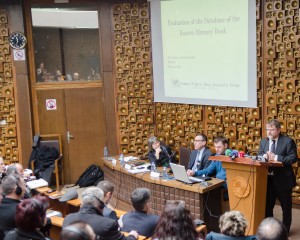
On February 4, 2015, at the National Archive in Pristina, Kosovo, HRDAG executive director Patrick Ball gave a presentation on research (done with colleague Jule Krüger) about the database of the Kosovo Memory Book (KMB). The KMB is part of the Humanitarian Law Centre in Belgrade and Pristina). In this photo, Patrick is speaking, and HLC-Belgrade […]

On May 6, 2015, HRDAG affiliate Anita Gohdes presented a talk at re:publica 2015, a conference on Internet and society, about data culled from social media and their impact on our understanding of the Syrian conflict. Pics or it didn’t happen—how does social media access affect what we know about killings in the Syrian conflict? […]
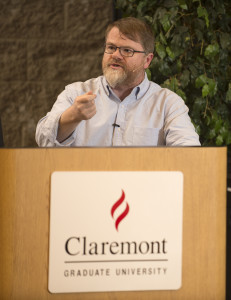
On May 15, 2015, HRDAG executive director Patrick Ball addressed a crowd of more than 100 people at Claremont Graduate University during a forum on the potential and limitations of big data. Patrick was one of five headline speakers at the event, which was moderated by Thomas Horan, CGU Professor and Director, Center for Information […]
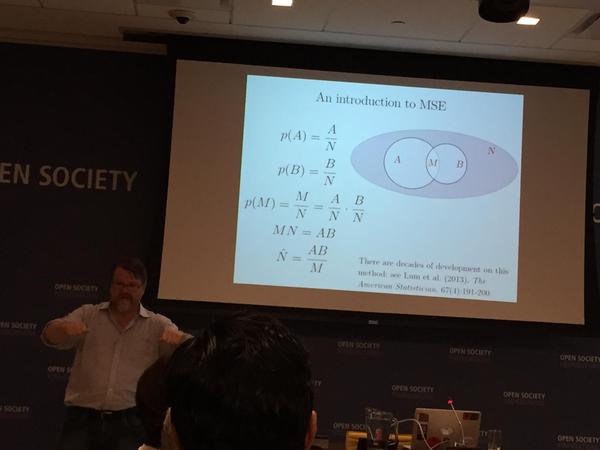
Hosted by the Open Society Foundations with Elizabeth Eagen. Statistical patterns in raw data tend to be quite different than patterns in the real world: patterns in data tend to reflect how the data was collected rather than changes in the real-world phenomena the data appears to represent. Using analysis of killings in Iraq, homicides […]

At the annual Joint Statistical Meetings of the American Statistical Association, held this year in Seattle, Washington, Megan Price gave a talk on developing a career in statistics. (Details here.) Patrick Ball, executive director of HRDAG, presented an invited paper, "Doing Good with Data Viz," on August 12. (Details here.) "In the measurement of mass […]
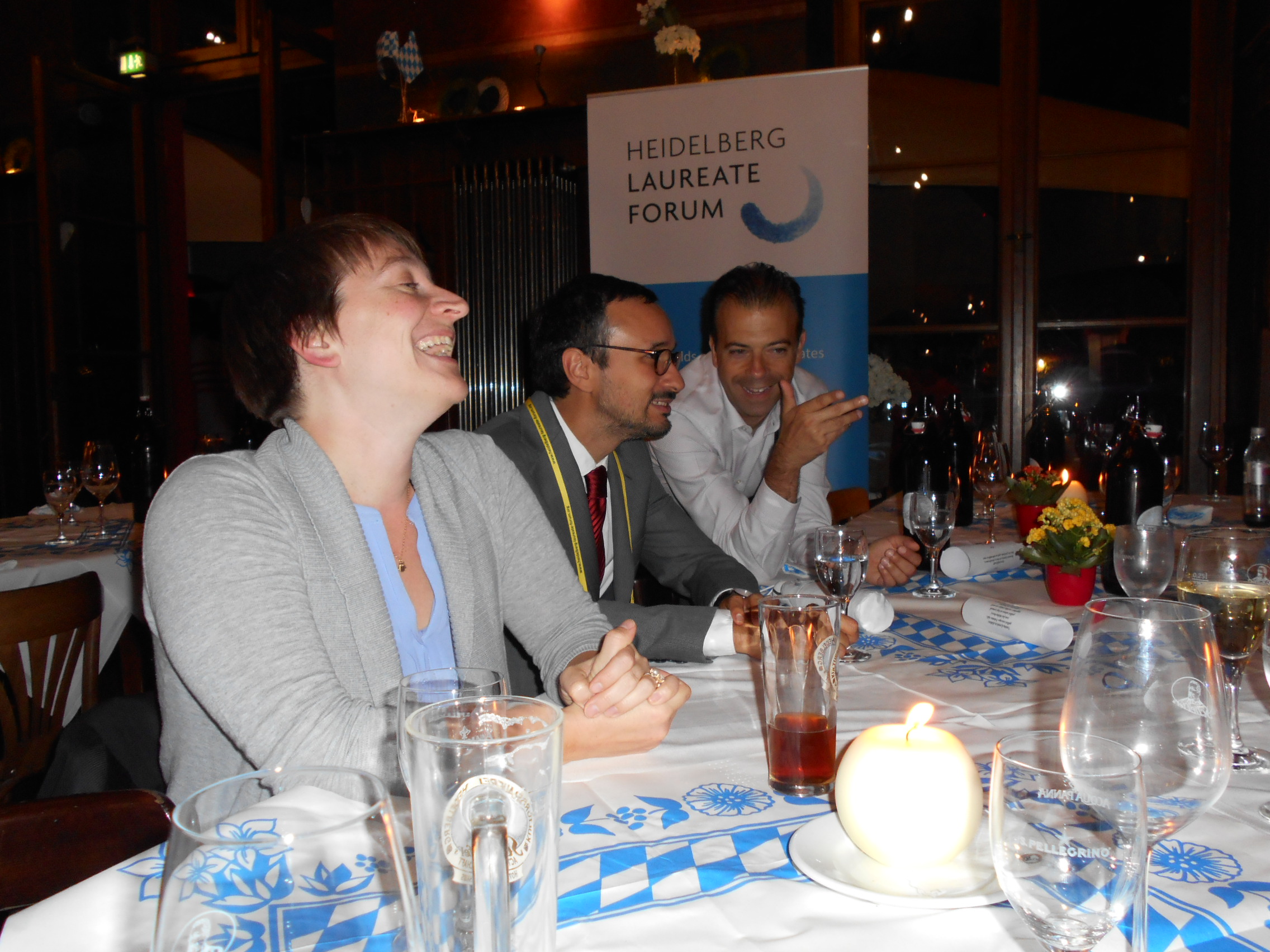
On August 25, 2015, at #HLF15, director of research Megan Price explained how HRDAG relies on many data sources in the documentation of human rights, such as bureaucratic or border crossing records. Quantitative analyses have the potential to contribute to transitional justice mechanisms, via empirical evidence—but most data available in transitional justice settings are incomplete. Using conventional "big […]

At the 111th Annual Meeting of the American Political Science Association (APSA), HRDAG colleagues Jule Krüger and Amelia Hoover Green will discuss "Filling in the Blanks: Data Problems and Solutions in the Study of Violence" as part of the HIDDEN VIOLENCE DURING ARMED CONFLICT: METHODOLOGICAL CHALLENGES AND INNOVATIONS panel. The panel will be chaired by […]
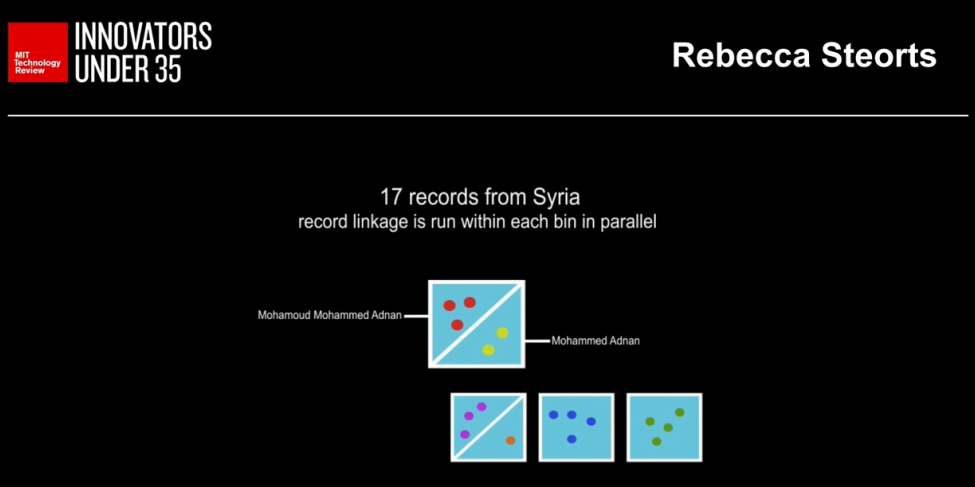
In September, our colleague Beka Steorts was named an Innovator Under 35 by MIT Technology Review. Two months later, she delivered a talk at EmTech -- at the MIT Media Lab -- on how "big data" could cut through the fog of war. Here's a link to her three-minute talk, and here's more information on […]

On November 26, Anita Gohdes will be awarded the German Dissertation Prize for the Social Sciences. The Koerber Foundation gives out a yearly prize for the most important dissertation in Germany in the Social Sciences, the Humanities, and the Natural Sciences. The award is given by the patron of the prize, the President of the German Parliament, Norbert Lammert.
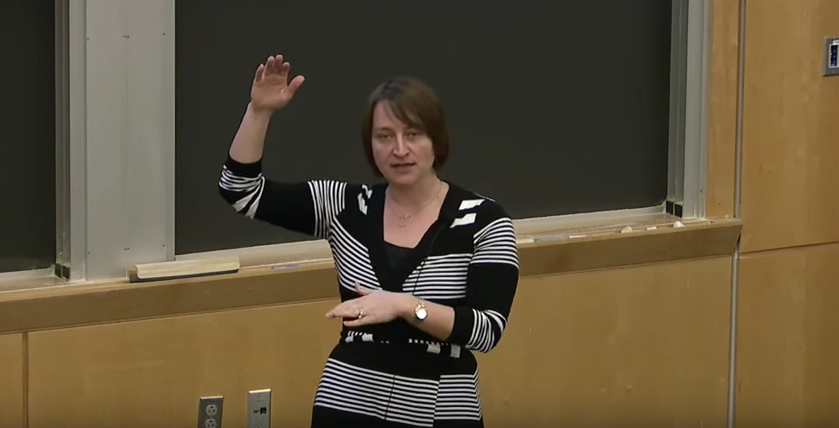
Megan Price, executive director of HRDAG, speaks at the Institute for Applied Computational Science (IACS) at Harvard. Her topic is "How Machine Learning Helps Count Casualties in Syria." Free and open to the public, with lunch. Room: Maxwell Dworkin G115. Video footage of the talk: youtu.be/B6xXeoo5QKA

ISA's 57th Annual Convention: Exploring Peace. Megan Price, executive director of HRDAG, will participate as a panelist in "A Million Deaths is a Statistic: New Findings from the Archives of Political Conflict." Her talk will be "Exploring the Contents of the Historic Archive of the National Police in Guatemala." This session is open to anyone attending ISA.

The Bernstein Institute for Human Rights at New York University Law School held a two-day conference exploring predictive analytics and human rights. HRDAG director of research Patrick Ball and lead statistician Kristian Lum spoke about Data Hygiene and Algorithmic Oversight. "Data-driven risk assessments raise difficult issues of oversight, since they rely on data sets and algorithms that […]
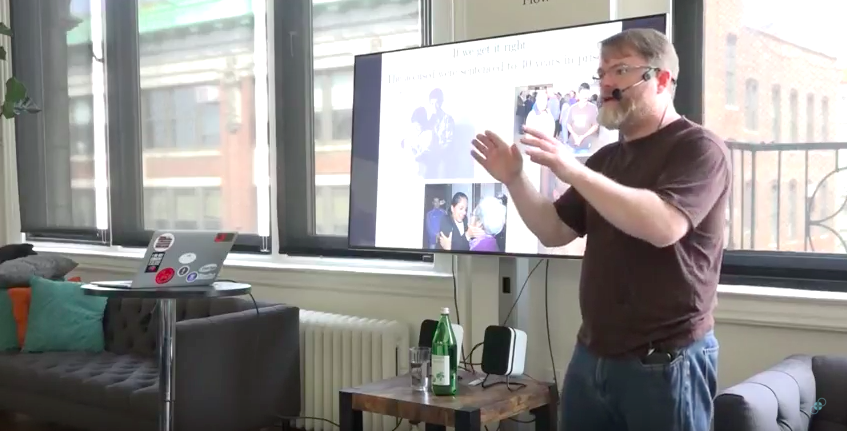
Databite No. 74: Patrick Ball presents Digital Echoes: Understanding Patterns of Mass Violence with Data and Statistics. This talk will explore the assumption that nearly every project using data must make: that the data are representative of reality in the world. Using analysis of killings in Iraq, homicides committed by police in the US, killings in the conflict in Syria, […]
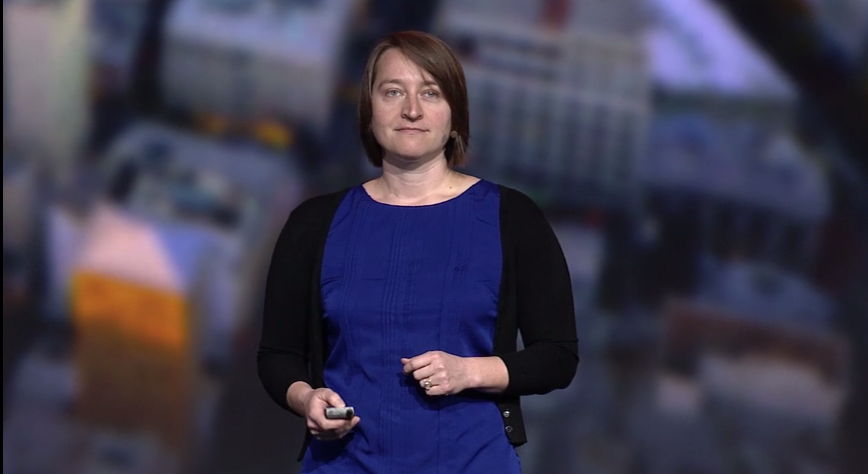
Megan Price, executive director of Human Rights Data Analysis Group, delivers the keynote speech at the Wednesday morning session. Video footage of the talk: https://www.oreilly.com/ideas/data-and-human-rights

Patrick Ball, director of research at HRDAG, discusses how to analyze hidden patterns using (mostly) public data about people killed in Syria, 2011-2015. This is part of the Disrupting Unity and Discerning Ruptures: Focus Aleppo lecture series, with Laura Kurgan and Avinaom Shalem. Please register: info @ c4sr.columbia.edu by March 24, 2016.

Megan Price, executive director of Human Rights Data Analysis Group, will be the keynote speaker for this meeting of the Bay Area UserR Group (R Programming Language). Check out this blogpost by Joseph Rickert of Revolution Analytics: "Megan Price, a long-time member and supporter of BARUG, will present the statistical techniques and R packages that the […]
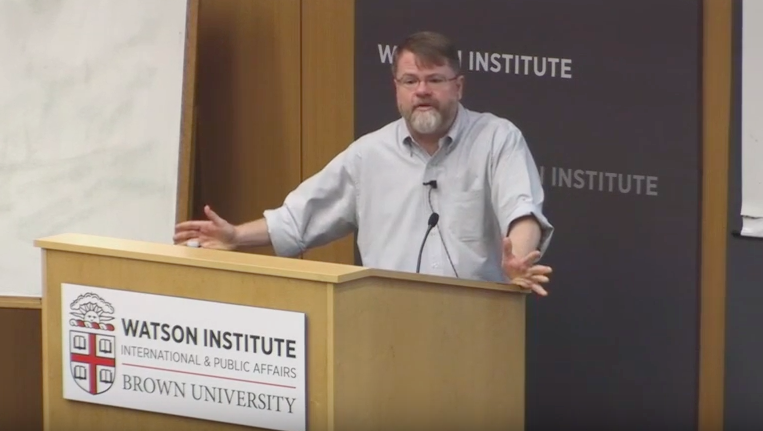
This talk will explore the assumption that nearly every project using data must make: that the data are representative of reality in the world. We will explore how, contrary to the standard assumption, how statistical patterns in raw data tend to be quite different than patterns in the world. Statistical patterns in data reflect how […]

HRDAG colleague William Isaac served on a panel, "Debate: Big Data Makes Policing Fairer," with Professor Elizabeth Joh and other researchers. He represented the HRDAG policing team.

Presentations by HRDAG team members Megan Price, Kristian Lum and Patrick Ball, as well as colleagues as James Johndrow,Daniel Manrique, Robin Mejia and Beka Steorts. Hosted by HRDAG Advisory Board member David Banks.
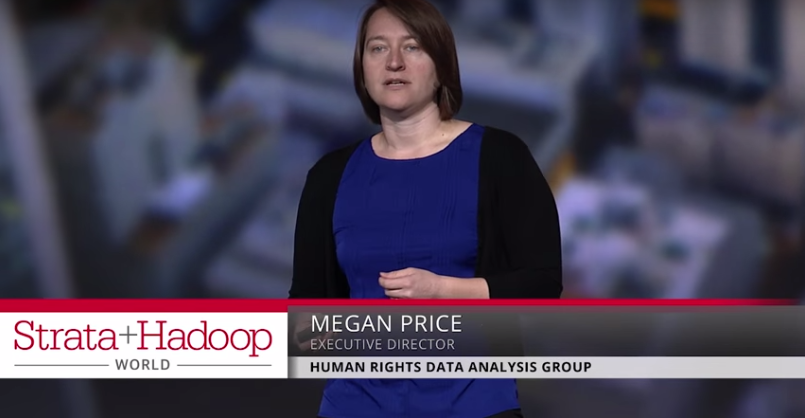
The same machine-learning methods used to learn about customers, improve speech recognition, and identify cat faces can also be applied to questions about conflict violence. Megan Price demonstrates how machine-learning methods help us determine what we know, and what we don’t, about the ongoing conflict in Syria. Megan then explains why these methods can be […]

HRDAG executive director Megan Price speaks on an invited panel. Stay tuned for details.

HRDAG policing team member Laurel Eckhouse presented and executive director Megan Price chaired: "Collecting Data on Gun Violence: Why Is It So Hard and What Are We Missing?" The talk was open to anyone registered for JSM.

HRDAG executive director Megan Price delivers the keynote: Using the Python Data Science Stack to Determine How Many People Have Been Killed in Syria. Open to anyone registered for PyData San Francisco. Follow on Twitter @PyData.

Isaac Newton Institute, Cambridge, UK, 12 Sept 2016 / Australian National University On 12 September, 2016, director of research Patrick Ball gave a talk at the University of Cambridge's Isaac Newton Institute (INI) for Mathematical Sciences on the topic of Deduplicating databases of deaths in war: advances in adaptive blocking, pairwise classification, and clustering. @NewtonInstitute […]

HRDAG's director of research, Patrick Ball, explores the assumption that nearly every project using data must make: that the data are representative of reality in the world.The talk illustrates how biases in raw data can be addressed through estimation, and explain why it matters. This talk will be followed by a Multiple Systems Estimation workshop, also by […]

HRDAG’s director of research, Patrick Ball, explores capture-recapture, a statistical method that enables the estimation of a total population using a set of intersecting, partial lists. This workshop follows a seminar on Understanding Patterns of Mass Violence with Data and Statistics, also by Patrick. Registration for this seminar will close at 17:00 on Friday 9 September 2016. Follow […]

HRDAG’s director of research, Patrick Ball, explores the assumption that nearly every project using data must make: that the data are representative of reality in the world.The talk illustrates how biases in raw data can be addressed through estimation, and explain why it matters. Please book your ticket for this event via Eventbrite by 20 September, as a light […]

Patrick Ball explores the assumption that nearly every project using data must make: that the data are representative of reality in the world. He examines how, contrary to the standard assumption, statistical patterns in raw data tend to be quite different than patterns in the world.
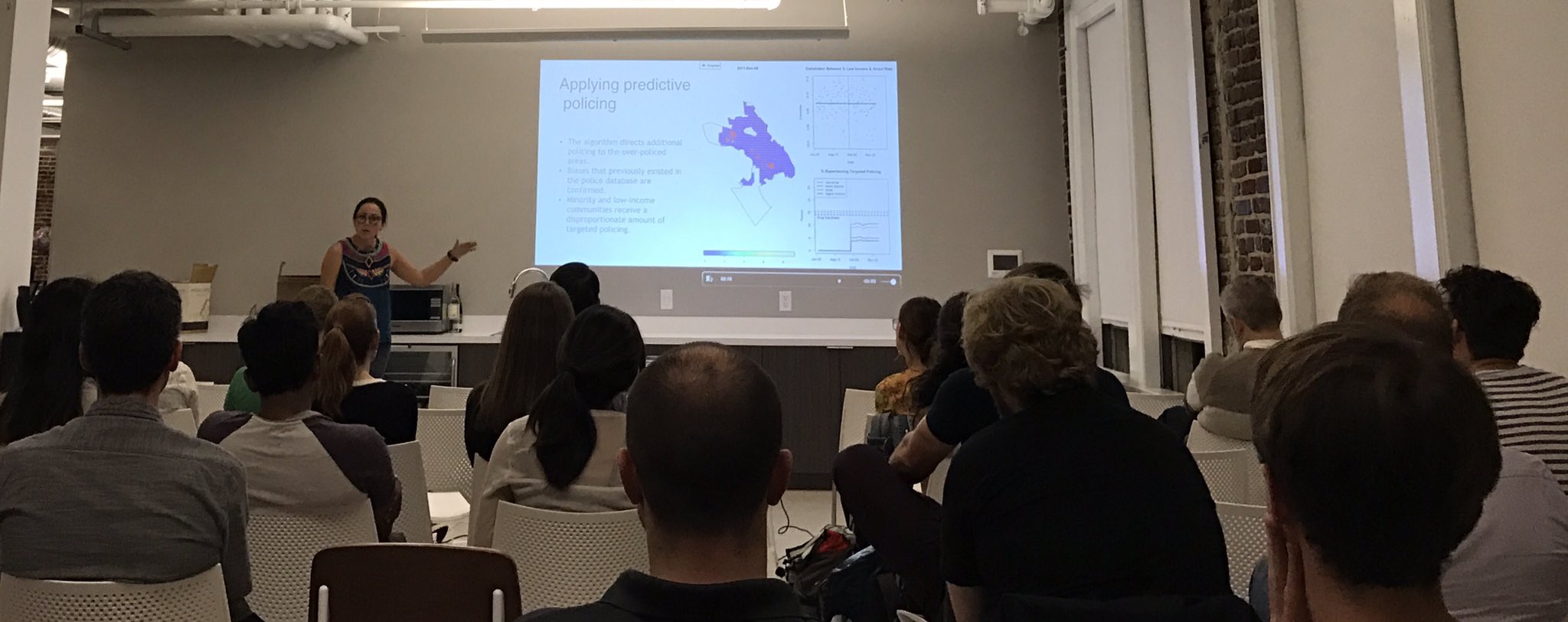
Kristian Lum spoke about her recent work exploring the consequences of police using predictive models.

HRDAG executive director Megan Price delivers a talk titled, "Flexing Your Self-Confidence Muscles," in Charlotte, North Carolina, at the Women in Statistics and Data Science conference. Open to anyone registered for conference.

Kristian Lum spoke on a panel about "Working together to reduce racial disparities in the justice system." Photo by Greg Jordan-Detamore @GJordanDetamore

Video of Patrick Ball at Kellogg Institute, Notre Dame, available here. Digital Echoes: Understanding Patterns of Mass Violence with Data and Statistics Data about mass violence can seem to offer insights into patterns: Is violence getting better, or worse, over time? Is violence directed more against men or women? But in human rights data collection, […]

HRDAG executive director Megan Price delivers a talk titled, "Using Machine Learning to Determine How Many People Have Been Killed in Syria." From the program: The Human Rights Data Analysis Group (HRDAG) uses methods from statistics and computer science to quantify mass violence. As part of that work, we rely on open source tools, including […]

Megan Price keynotes the Women in Data Science conference in Boston, Massachusetts: “Does the Truth Matter? How Data Analysis Can Contribute to Accountability?” The Women in Data Science Conference, a partnership of Mount Holyoke College, Smith College, and MassMutual, shines a spotlight on the leading work of women in data science across research, education, and industry domains. […]

Kristian Lum delivers her talk, "What's an Algorithm Got to Do with It?" at the National Cyber Security Alliance's Data Privacy Day.

HRDAG executive director Megan Price talks with Mike Delgado (Experian Data Talks) about ways to use data to promote social justice and human rights around the world. January 26, 2018 / Experian #DataTalk